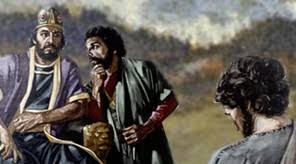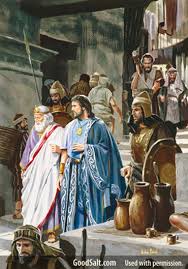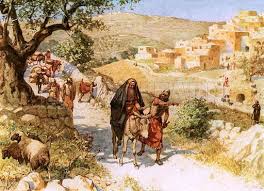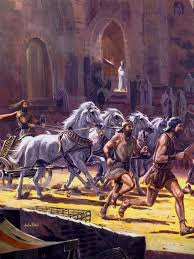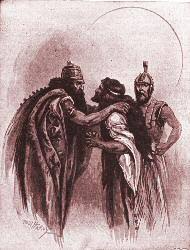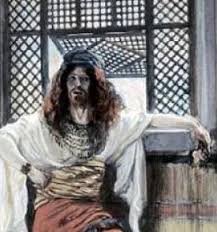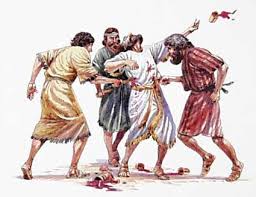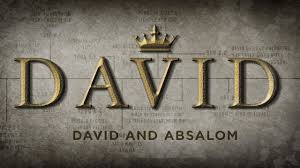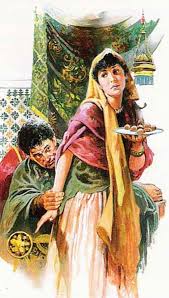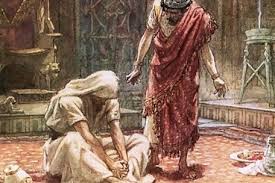Dx – Ahithophel Commits Suicide Second Samuel 17: 17-23
Ahithophel Commits Suicide
Second Samuel 17: 17-23
Ahithiphel commits suicide DIG: How does Ahithophel strike you and why? Odd? Predictable? Just desserts? Tragic? Comic? Better him than David? An answer to David’s prayer? Meanwhile, how did delaying Absalom’s attack benefit David? How did God use the wife of a man in Bahurim? What does that teach us about spontaneous acts of service? What did hanging on a tree signify to an Israelite (Deuteronomy 21:23)?
REFLECT: What “hiding place” ministry will you conduct to protect innocent people, as the man and his wife in Bahurim? On the other hand, perhaps you are like Ahithophel: Where are you looking for an “easy victory” in a tough situation? How strong is your desire for the approval of others? Where have you failed to live up to Godly expectations placed on you by yourself or others? What gets you feeling depressed, even suicidal at times? What do you do with those feelings? How can the Holy Spirit help you overcome such tendencies of Ahithophel? What can we learn from the way Ahithophel’s life came to an end?
977 BC
This is part of a 24-hour period starting at 15:13 and extending all the way to 17:23.
David’s spy system was working like a fine tuned machine. Hushai relayed Ahithophel’s plan (to see link click Dv – Ahithophel is Describe in Glowing Terms) to Zadok and Abiathar, then a female servant traveled the short distance from Tziyon to En Rogel, where Jonathan and Ahimaaz were staying. En Rogel, meaning Washerman’s Spring, comes from a Hebrew root that elsewhere means spy. It forms a wordplay on the mutual spying and intrigue that take place throughout these chapters between Absalom’s men and David’s men.429 The female servant was to go and inform Jonathan and Ahimaaz, and they were to go and tell King David, for they could not risk being seen entering the City. But in spite of their caution a young man saw them in El Rogel and, wanting to impress the new king, told Absalom. So the two of them left at once and went to the house of a man in Bahurim, about two miles away, who must have been a known supporter of David. At this point, the account reads like the story of the two spies recorded in Joshua 2 where Rahab hid the two spies under stalks of flax on the roof of her house. Here, the man in Bahurim had a well in his courtyard, and they climbed down into it. His wife took a cloth and spread it out over the opening of the well and scattered grain over it as if drying the grain in the sun. The ruse worked and no one knew anything about Jonathan and Ahimaaz in the well (Second Samuel 17:17-19).
When Absalom’s men came to the woman at the house, they asked: Where are Ahimaaz and Jonathan? The woman answered: They crossed over the brook. The woman lied in this case, but it was a lie to save their lives, the lives of David and the people who fled with him. The men searched but found no one, so they returned to Jerusalem. After they had gone, the two climbed out of the well and went to inform King David. They said to him, “Set out and cross the river [Jordan] at once; Ahithophel has advised such and such against you.” Sensing that there was no time to loose, David and all the people with him set out and crossed the Jordan, which put him out of danger of any surprise attack. By daybreak, no one was left who had not crossed the Jordan under the cover of darkness (Second Samuel 17:20-22). So whatever Absalom decided, Hushai’s advice had saved David. This distance between himself and Absalom gave David the time and the room to maneuver. Absalom’s men returned to Yerushalayim empty-handed, but Absalom didn’t see their failure as a serious problem. How wrong he was!430
This was not the first time a woman had lied to save David (Second Samuel 19:17), or the people of Isra’el (Joshua 2:4-7). This episode does not advance the story line. But it does articulate that David had a daring, effective intelligence network and had great support among the people. It also emphasizes God’s protective care over David. Victory is not given to the quick or the strong but to the chosen (Proverbs 21:30-31). Nevertheless, David should not have been underestimated, as he was by Absalom.431

The fact that David got across the Jordan put an end to Ahithophel’s plan to capture the king before he could reach the Transjordan. By this delay, Absalom had forfeited the advantage and Ahithophel could see the handwriting on the wall – and he saw doom written all over it. As a seasoned strategist, Ahithophel knew given time to regroup, David’s crack troops would decimate Absalom’s forces, after which he would be executed for the traitor he was.432 When Ahithophel saw that his advice had not been followed, he saddled his donkey and set out for his house in his hometown. Calmly he accepted the situation and resolved what he would do. A deliberate and practical man to the very end, he put his house in order and then hanged himself. He had risked everything in his defection and this was his reward. So just as Ahithophel had betrayed an anointed king of Isra’el and ended up hanging himself, so also would the betrayer of another Anointed King come to the same shameful end (see commentary on The Life of Christ Lm – Judas Hangs Himself).433 So he died and was buried in his father’s tomb (Second Samuel 17:23). He could not have known that YHVH defeated him.
Ahithophel’s end is a sign of what will happen to all the enemies of Ha’Shem and His Kingdom. You cannot attack the Kingdom of God without – sooner or later – being crushed by the power of God. The Ahithophels and Adolfs, the Hamans and Himmlers, the Sennacheribs and Stalins all perish and rot in the junk yards of history because ADONAI-Tzva’ot stands guard over His Kingdom and its subjects.434




